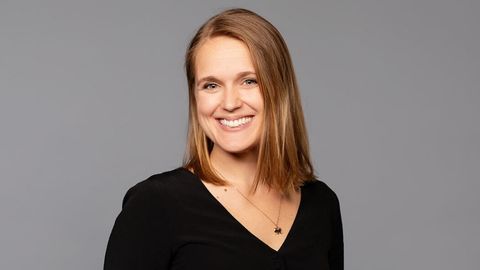Following a passion for science — away from academia
Brittany Leigh didn’t plan to become a professional science communicator. She studied biological oceanography, focusing on viruses in marine life, during her Ph.D., and then studied viruses in mosquitoes during her postdoc. For much of her early career, she pictured herself on the professor track.
“I loved: one, being involved in cool science; two, being able to talk to people about that science; and, three, being able to have the flexibility to make my own schedule. But during my postdoc, I realized that those main things are not unique to being a professor,” Leigh said.

Today, Leigh is a senior account executive at LifeSci Communications, which provides services to all sorts of clients — from early-stage biotech companies to commercial-stage pharma companies.
A realization while alone in the lab
During the height of the COVID-19 pandemic, Leigh was a postdoc at Vanderbilt University and, due to capacity restrictions, was working alone in the lab. “That was my hard, deep look into what I was doing. Being siloed in a lab let me think, ‘Is this really where I want to go?’” she said.
Part of what she realized at the time was that the things she loved about science were not actually the biggest part of a principal investigator’s job. Much of a PI’s time is spent writing grants and doing administrative tasks, which she knew she didn’t want to do.
Once she accepted that the professor route was not what she wanted, she had to figure out what she did want. She had to figure out where else she could use her passion for science.
However, all the training she got ended up helping her identify what she was looking for.
During her postdoc, she took courses in teaching and did volunteer presentations for the public, which taught her to communicate to different audiences and, perhaps more importantly, taught her that she loved doing that.
“I started Googling, ‘science communication jobs,’ and I found the site DOCjobs (a job site that lists jobs for scientists, outside of traditional academia) and a job at LifeSci was posted.” She applied — “just to see what would happen” — and ended up getting a job she loves.
‘At the forefront of all this cool science’
At LifeSci, Leigh handles public relations and communications for six clients focused on gene therapy, infectious disease and cancer.At any point on any given day, she might be drafting a press release that explains a company’s data in an accessible way, developing a website, designing a poster for a conference, working with animators on videos, or managing social media, including using it for clinical trial recruitment. She might even write a scientific paper if the company needs that.
Her audiences include investors, other companies, doctors, patients and the media. “If someone wants to talk to (a person at) the company, they go through me,” she said.
LifeSci tends to hire scientists with some writing experience, Leigh said, and trains them in the specifics of the writing needed, as opposed to hiring professional writers and teaching them the science subject areas. The company assigns writers to clients based on the type of science expertise that is needed and the interests of the writer.
She said that she gets to learn about all kinds of new research, to synthesize the information and write about it, and share it with others, which are all the things she’d wanted out of being a professor.
“I get to be at the forefront of all this cool science and see it transition from basic science to the bedside,” she said.
Importantly, Leigh works remotely, which is important to her. With a partner in the military, Leigh needs to be free to move around and to have time to dedicate to family.
Take time to reassess
In academia, sometimes your research can become your life. Leigh said, at LifeSci, she was able to switch away from that point of view. “There are boundaries,” she said, and people value your time.
She said she also has learned that it’s important to think about what you want and why. “Check in with yourself and see if you still love the things you are doing, and it’s OK if not,” she said.
She noted that sometimes people can get stuck doing something they used to love, something they thought they loved, or something they thought they were going to love.
“I’m always making sure I’m really nurturing the things I love to do so I can grow in that way.”
Enjoy reading ASBMB Today?
Become a member to receive the print edition four times a year and the digital edition monthly.
Learn moreFeatured jobs
from the ASBMB career center
Get the latest from ASBMB Today
Enter your email address, and we’ll send you a weekly email with recent articles, interviews and more.
Latest in Careers
Careers highlights or most popular articles

Redefining lipid biology from droplets to ferroptosis
James Olzmann will receive the ASBMB Avanti Award in Lipids at the ASBMB Annual Meeting, March 7–10, just outside of Washington, D.C.

Creating change in biochemistry education
Pamela Mertz will receive the ASBMB William C. Rose Award for Exemplary Contributions to Education at the ASBMB Annual Meeting, March 7-10 in Washington, D.C.

Trainee mentorship as immortality
Suzanne Barbour will receive the ASBMB Sustained Leadership Award at the ASBMB Annual Meeting, March 7-10 in Washington, D.C.

Upcoming opportunities
Join us Feb. 5! The monthly ASBMB Transcription Webinars aim to facilitate knowledge exchange and collaboration among researchers in the fields of transcription, chromatin and epigenetics.

Life in four dimensions: When biology outpaces the brain
Nobel laureate Eric Betzig will discuss his research on information transfer in biology from proteins to organisms at the 2026 ASBMB Annual Meeting.

Redefining excellence to drive equity and innovation
Donita Brady will receive the ASBMB Ruth Kirschstein Award for Maximizing Access in Science at the ASBMB Annual Meeting, March 7–10, just outside of Washington, D.C.

